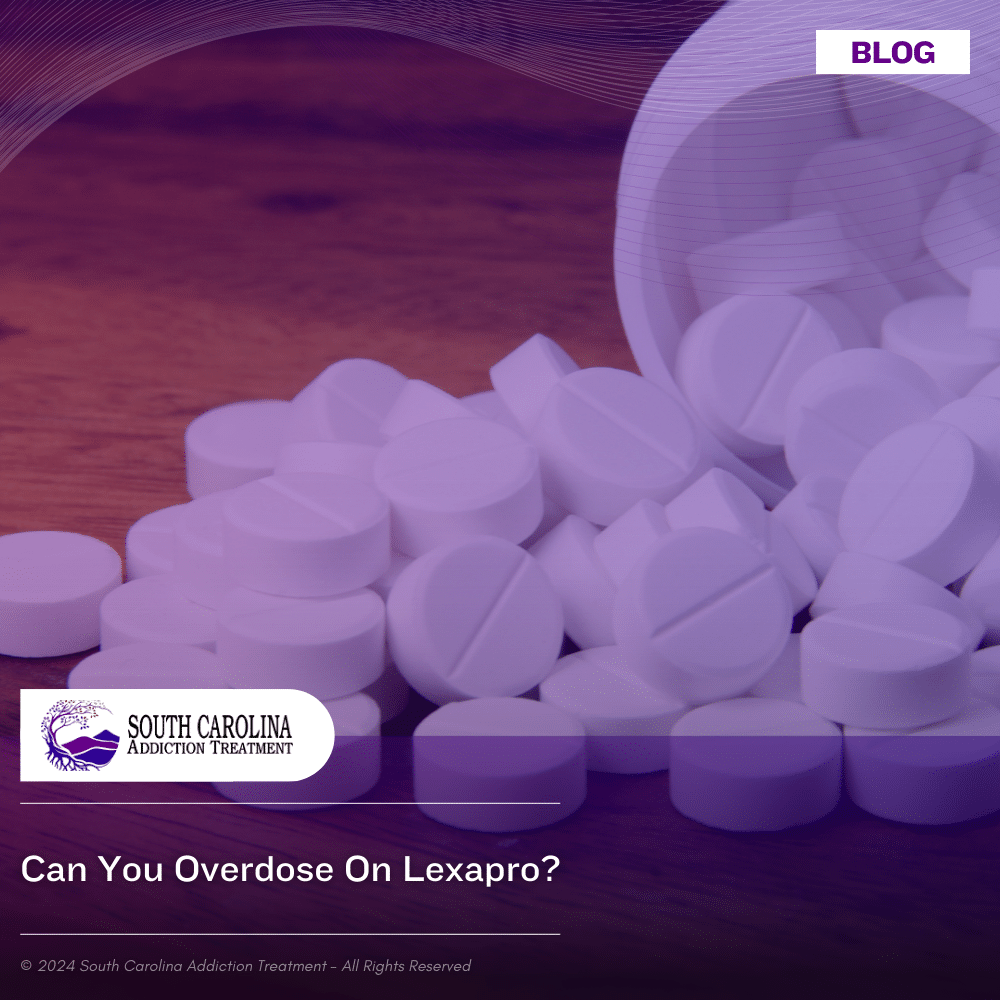Can You Overdose on Lexapro?

Medically Verified: 2/1/24
Medical Reviewer
Chief Editor

All of the information on this page has been reviewed and verified by a certified addiction professional.
Lexapro is the brand name for a prescription medication referred to as escitalopram.
Lexapro is a selective serotonin reuptake inhibitor (SSRI) that is mainly used to treat depression and anxiety. It also has many off-label uses, including managing obsessive-compulsive disorder (OCD), certain eating disorders, post-traumatic stress disorder (PTSD), and even premenstrual dysphoric disorder (PMDD).[1]
Escitalopram is not considered to be a controlled substance, which means it is generally safe to use and poses minimal (if any) threat of abuse. However, some people might attempt to abuse Lexapro if they are struggling to cope with their mental health symptoms. Unfortunately, taking more Lexapro than you are prescribed can lead to an overdose.
What are the Side Effects of Lexapro?
Like any medication, Lexapro may cause side effects. Most of the side effects subside after the body adjusts to the medication. However, if you experience long-term side effects that are difficult to cope with, you should always consult your doctor.
The common side effects of Lexapro include:[1]
- Headaches
- Nausea
- Diarrhea
- Dry mouth
- Increased sweating
- Feelings of nervousness
- Restlessness
- Fatigue
- Having trouble sleeping
- Decrease in sexual drive or ability
If you experience severe side effects such as low sodium blood levels or a condition known as serotonin syndrome, you should contact your doctor or emergency medical services immediately.
Do People Abuse Lexapro?
Since Lexapro does not cause a noticeable intoxicating effect, it is not commonly abused. However, people with substance use disorders who are prescribed Lexapro might attempt to misuse it by taking large amounts. Unfortunately, this can be incredibly dangerous and potentially lead to an overdose.
While abuse is uncommon, the signs of Lexapro misuse may include:
- Exceeding the prescribed dosage of escitalopram
- Faking symptoms of depression or anxiety to receive a prescription
- Going to multiple doctors to receive more than one prescription
- Displaying the signs of drastic mood swings
- Having disruptions in sleeping patterns
- Displaying the signs of sedation
- Pretending to lose prescriptions to receive early refills of Lexapro
- Needing a higher dose of Lexapro to experience the desired effect
- Withdrawing from friends and family and experiencing social isolation
- Concealing Lexapro use by friends and loved ones
- Losing interest in previously enjoyed activities
- Taking Lexapro with alcohol
Can You Overdose on Lexapro?
Lexapro works to treat depression and anxiety by increasing the amount of serotonin in the brain. While it does not get you high, some people might think taking large amounts of it will make them feel euphoric because it increases your serotonin levels. However, taking large doses of Lexapro can lead to a life-threatening overdose.
The maximum dose of Lexapro recommended in one day is 20mg. If you were to take a significantly higher dose than this, you could experience an overdose. It is important to note that while Lexapro overdoses are infrequent, they can be deadly when they occur.
The symptoms of a Lexapro overdose include:[2]
- Blurry vision
- Slowed heart rate
- Confusion
- Dilated pupils
- Fever
- Dizziness
- Insomnia
- High blood pressure
- Nausea and vomiting
- Convulsions or seizures
- Coma
- Serotonin syndrome
If you take a large dose of Lexapro, you could develop a life-threatening condition known as serotonin syndrome. This condition develops when your brain produces too much serotonin, causing symptoms like agitation, hallucinations, vomiting, fast heartbeat, and rapid changes in blood pressure.[3]
How to Avoid a Lexapro Overdose
The best way to avoid a Lexapro overdose is by sticking to your prescribed dose. Additionally, you should never take Lexapro unless it is prescribed to you by your doctor, as you never know how your body could react to a prescription medication.
Additionally, you should avoid combining Lexapro with other medications unless your doctor says it is safe to do so. Medications that should not be mixed with escitalopram include:
- Monoamine oxidase inhibitors (MAOIs)
- Serotonergic drugs
- Other SSRIs or SNRIs
- Certain antipsychotics
- Certain opioids
- Amphetamines
- Triptans
Mixing Lexapro with other antidepressant medications without consulting a doctor first could result in serotonin syndrome. As a result, you should never take prescription medications while on Lexapro without direction from your doctor.
Find Help Today
If you or a loved one struggles with substance abuse, you could be suffering from an addiction. Drug addiction and alcoholism can lead to devastating effects on every area of your life, making it vital that you seek professional help. Thankfully, addiction treatment centers can provide you with the tools and support you need to overcome drug and alcohol abuse and maintain long-term sobriety.
At South Carolina Addiction Treatment Center, we offer a continuum of care that includes medical detox, evidence-based behavioral therapies, group counseling, and aftercare services. All of these services work together to provide our clients with a strong foundation of recovery to rely on.
To learn more about our addiction treatment center in South Carolina, please contact us today.
References:
- The National Alliance on Mental Illness (NAMI): Escitalopram (Lexapro), Retrieved November 2023 From https://www.nami.org/About-Mental-Illness/Treatments/Mental-Health-Medications/Types-of-Medication/Escitalopram-(Lexapro)
- Medline Plus: Escitalopram, Retrieved November 2023 From https://medlineplus.gov/druginfo/meds/a603005.html
- Medline Plus: Serotonin Syndrome, Retrieved November 2023 From https://medlineplus.gov/ency/article/007272.htm

